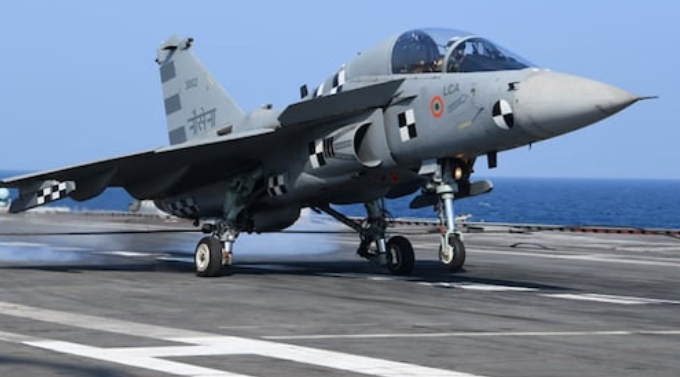
Amid escalating tariff tensions between India and the United States, questions are being raised about the future of key defense deals, particularly the supply of GE engines for India’s Tejas fighter jets. The big question is whether Washington will continue to honor its commitments or if trade disputes will cast a shadow over the ongoing cooperation.
In recent weeks, the relationship between the two countries has been strained after US President Donald Trump imposed a 25% tariff on Indian goods, later announcing an additional 25%, bringing the total to 50% starting August 27. Currently, the first 25% tariff is in place. Trump has also warned India against buying oil from Russia, while granting China a 90-day tariff relief and simultaneously holding meetings with Russian President Vladimir Putin. This geopolitical balancing act has left New Delhi cautious, especially as Washington’s policy appears increasingly unpredictable.
Against this backdrop, concerns emerged over whether US-India defense cooperation—especially the Tejas program—might be affected. Initial reports claimed that some Indian defense deals had been canceled, but the Ministry of Defence (MoD) denied such claims, stating that talks were ongoing. Sources indicate that India is working to accelerate the delivery of F404 engines for the Tejas Mark 1A fighter jets.
Last year’s delays have meant that GE has so far delivered only two engines to India, with three more expected this month. The company has promised to supply two engines per month starting October, which will assist Hindustan Aeronautics Limited (HAL) in ramping up production. India initially ordered 99 F404 engines for the Tejas Mark 1A, but delays slowed the process. Currently, GE is supplying one engine per month, with an increase planned from October.
In a significant move to bolster India’s air power, the Defence Ministry has already approved the procurement of 97 additional Tejas Mark 1A aircraft, and the follow-up F404 engine deal for these fighters is nearly finalized, with completion expected by the end of August. India and the US are also in discussions for the purchase of F414 engines, which would power the Tejas Mark 2 and the Advanced Medium Combat Aircraft (AMCA). These engines would be manufactured in India under a transfer of technology (ToT) arrangement. While technical talks have been completed, the agreement has yet to be signed.
The US is expected to send a delegation to India soon for further negotiations on defense procurement. The MoD has clarified that despite the tariff hikes, there has been no change in the pace of defense acquisitions. Talks are also continuing for the purchase of six additional P-8I maritime surveillance aircraft for the Indian Navy.
India is pursuing a clear strategy of reducing dependency on foreign suppliers by insisting on technology transfer for major defense platforms. The country is determined not to rely solely on off-the-shelf imports but to develop the capability to manufacture critical components domestically. The focus is on securing ToT agreements for engines, fighter jets, and other advanced defense systems to strengthen self-reliance under the “Atmanirbhar Bharat” initiative.
Meanwhile, India’s squadron strength has dropped to 29 with the phasing out of older MiG aircraft. To address the shortfall, the Multi-Role Fighter Aircraft (MRFA) program is being considered, with the Rafale being a top contender. Other options include American and Swedish aircraft, though India has shown no interest in the F-35. The Swedish Gripen is also being evaluated as a possible addition to the fleet.
Following “Operation Sindoor,” India’s defense establishment has emphasized that future deals must go beyond simple procurement. The goal is to secure advanced technology alongside hardware purchases so that India can eventually manufacture fighter jet engines domestically. The upcoming US delegation’s talks will be key to determining whether Washington is willing to meet New Delhi’s terms.
Despite the trade tensions, both sides appear committed to keeping defense cooperation on track, with engine deliveries for the Tejas program set to continue and major projects like the MRFA acquisition moving forward. For India, the priority remains clear: secure technology, build at home, and strengthen indigenous defense capabilities.
Disclaimer:
This article is based on publicly available news sources and official statements. While every effort has been made to ensure accuracy, developments in defense procurement and international relations may change over time. Readers are advised to verify information from official government and defense channels before making conclusions.




